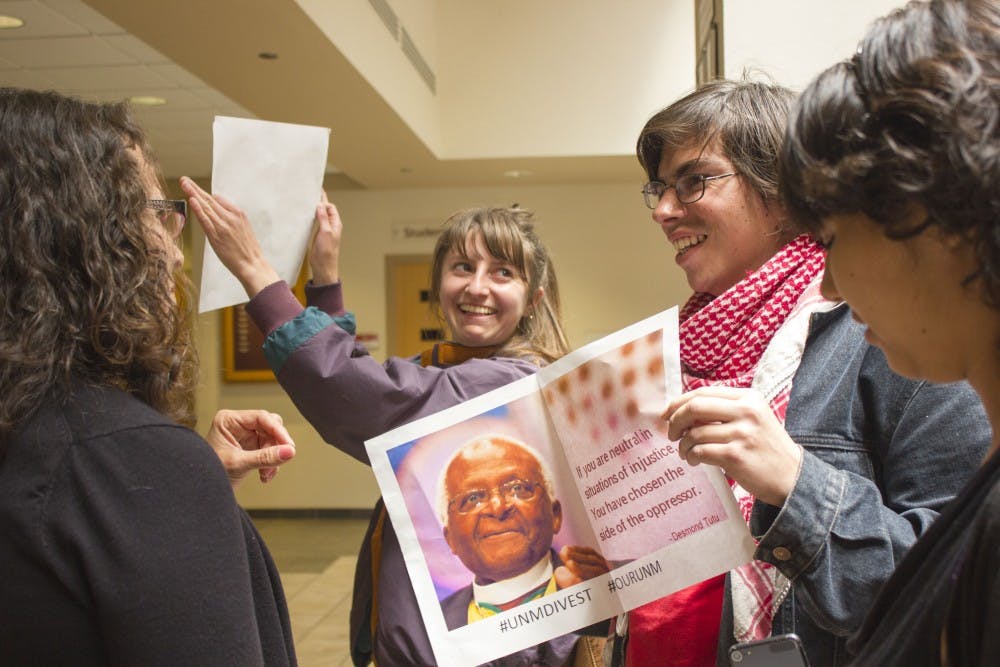news@dailylobo.com
@ArdeeTheJourno
UNM student leaders continue to urge President Robert Frank to reverse his decision to exempt the Athletics Department and University Libraries from the student fee allocation process.
The Associated Students of the University of New Mexico and the Graduate and Professional Student Association hosted a press conference Friday regarding the change.
During the conference, GPSA President Priscila Poliana insisted that Frank reverse his decision and called on students for their support. Poliana said the decision to remove two of the departments that receive the most student fee allocations from students’ hands is disrespectful toward University tradition.
“This has been done since 1918 in the University of New Mexico, and as Lobos we take a great deal of pride in maintaining this tradition,” she said.
During a private meeting on April 17, Frank informed student leaders that the Student Fee Review Board, which approves student fee allocations for University departments, will no longer have the authority to provide input on Athletics’ and Libraries’ budgets.
For fiscal year 2015, Athletics received the second highest amount of allocated student fees from the University, obtaining 24 percent of the fee budget of about $16 million, according to a document from GPSA. Libraries, on the other hand, obtained about 5 percent of the total amount, according to the document.
Poliana said that, on average, each UNM student pays about $1,200 in student fees per year.
ASUNM President Isaac Romero, who was present at the conference, said conversations about the change started in August of last year with the regents’ push for the comprehensive fee policy. The policy aimed to take away the SFRB’s ability to pass recommendations on four of the biggest recipients of student fees, including Student Health and Counseling, Athletics, Libraries and Information and Technology.
According to a joint statement from GPSA and ASUNM drafted in early March, Frank said he would not make any changes to the SFRB policy with regard to Athletics and Libraries until the UNM administration formed a workgroup to address the issue. Frank said he would not make any changes during the summer.
Poliana said Frank has not respected this agreement.
“We were very surprised by this decision,” she said. “Isaac and I were not involved in this process. As a matter of fact, Isaac and I were led to believe that the situation was completely different … I believe that if there had been a misunderstanding, there had been plenty of time for (it) to be addressed.”
Get content from The Daily Lobo delivered to your inbox
Romero said that although he is glad only two of the departments addressed by the comprehensive fee policy were taken away from SFRB, he still does not approve of Frank’s decision.
“On paper, they got half of what they wanted,” he said.“Instead of getting all four entities, they got two of them. However, what we’re pushing for is making sure that none of these gets through, because we believe that any sort of removal of students’ voices is harmful to students.”
He said the SFRB process is an effective and essential budget process, in contrast to what Frank might have claimed in the reasoning behind his decision.
“The reasons I got out of it was that (the SFRB process) is contentious, it’s not cooperative, it’s too combative,” Romero said. “We don’t think that’s the case. We think that a lot of this process is necessary because that way, we can make sure where our fees are going.”
Frank insisted that he issued the decision to simplify and shorten UNM’s general budget process. He said the change would allow for earlier talks among the regents and for input from community members and the state Legislature.
“We just had to have a much shorter budget process as we make changes in our budget,” Frank said. “We’ve taken a couple of decisions to move it into a shorter timeline … The budget process comes too late in the year, and we don’t have the time to have those kinds of conversations with the regents, and we don’t have enough time to have conversations outside of the regents.”
Frank said students will also have more opportunities to provide input on the budget allocation process through the newly formed Student Cabinet.
According to an email from the Office of the President sent Friday, Frank decided to form the cabinet to “facilitate communication with a broader cross-section of our students, both undergraduate and graduate.”
The cabinet will welcome nominations and applications this week, according to the email.






